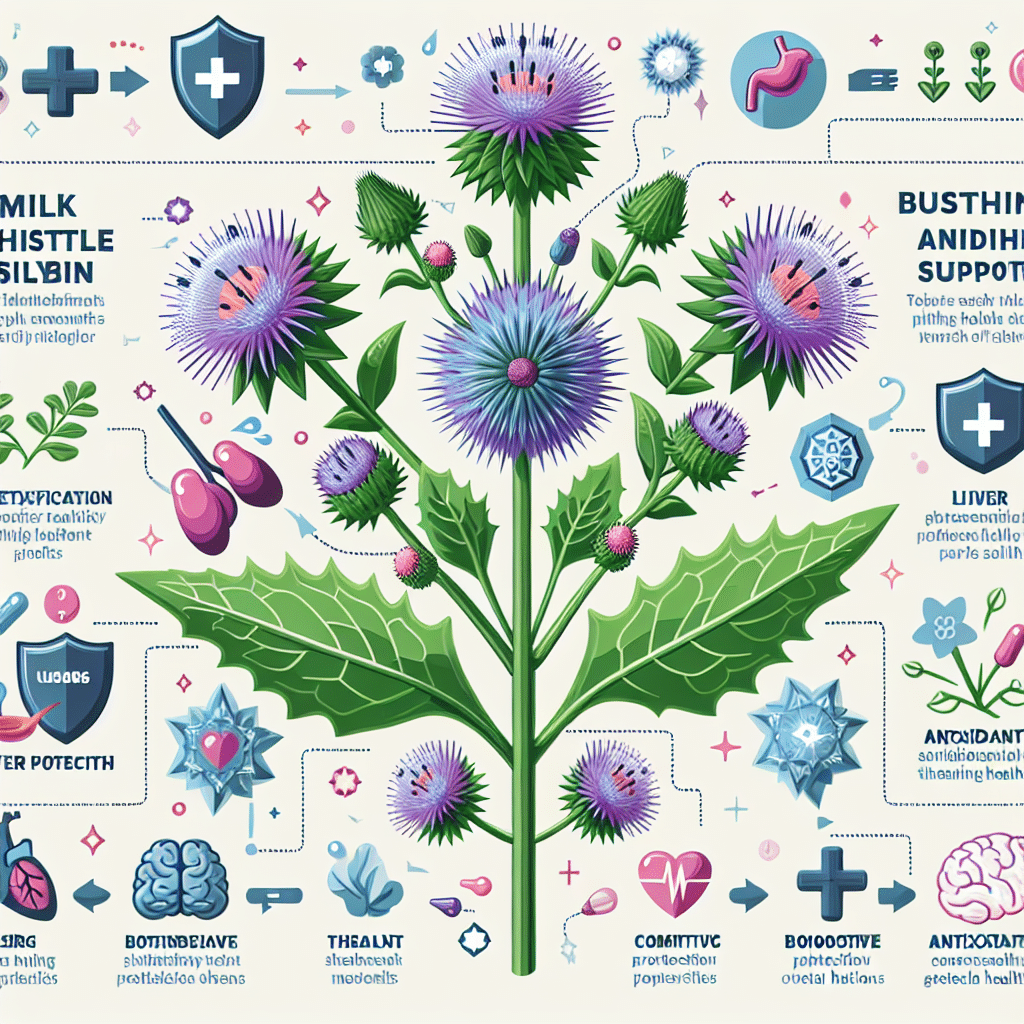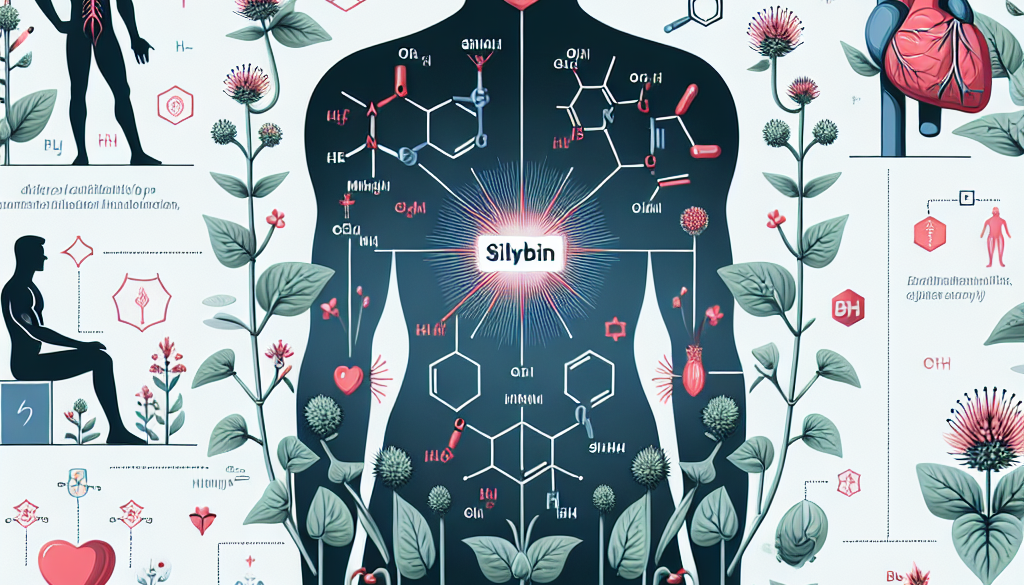Milk Thistle Silybin Benefits and Uses
-
Table of Contents
- Milk Thistle Silybin: Unveiling Its Remarkable Health Benefits and Uses
- Understanding Silybin and Its Origins
- Scientifically-Proven Benefits of Silybin
- Uses of Silybin in Traditional and Modern Medicine
- Case Studies and Clinical Trials
- Recommended Dosage and Potential Side Effects
- Conclusion: Embracing the Power of Silybin
- Discover ETchem’s Protein Products
Milk Thistle Silybin: Unveiling Its Remarkable Health Benefits and Uses

Milk thistle, a plant with a distinctive purple flower and white-veined leaves, has been used for centuries as a natural remedy for various ailments. The most active component of milk thistle is silybin, also known as silibinin, which is part of the silymarin complex. This article delves into the myriad of benefits and uses of silybin, supported by scientific research and clinical studies.
Understanding Silybin and Its Origins
Silybin is a flavonolignan compound extracted from the seeds of the milk thistle plant (Silybum marianum). It is the most potent ingredient of the silymarin complex, which comprises other flavonolignans such as silydianin and silychristin. Silybin has been the subject of extensive research due to its potential therapeutic properties.
Scientifically-Proven Benefits of Silybin
Research has highlighted several health benefits associated with silybin, making it a valuable supplement for various health conditions:
- Liver Health: Silybin is best known for its hepatoprotective properties. It has been shown to protect the liver from toxins, help repair liver cells, and improve liver function in individuals with liver diseases such as cirrhosis, jaundice, hepatitis, and fatty liver disease.
- Antioxidant Effects: As a powerful antioxidant, silybin helps combat oxidative stress and free radical damage, which are linked to chronic diseases and aging.
- Anti-Inflammatory Action: Silybin exhibits anti-inflammatory properties, which can be beneficial in reducing inflammation in various conditions, including liver diseases and other inflammatory disorders.
- Cancer Research: Some studies suggest that silybin may have anti-cancer properties, potentially inhibiting the growth of cancer cells and enhancing the efficacy of chemotherapy drugs.
- Cardiovascular Health: There is evidence that silybin may help lower cholesterol levels and improve blood sugar control, contributing to better heart health.
- Neuroprotective Potential: Silybin may also protect against neurodegenerative diseases like Alzheimer’s by reducing the buildup of amyloid plaques and supporting cognitive function.
Uses of Silybin in Traditional and Modern Medicine
Traditionally, milk thistle and silybin have been used for treating liver and gallbladder disorders. In modern times, their use has expanded to include:
- Supplements for liver detoxification and support
- Adjunct therapy for individuals undergoing treatment for liver diseases
- Complementary treatment for people with diabetes to help manage blood sugar levels
- Supportive care for those undergoing cancer treatment
- Preventive supplements for those at risk of heart disease
Case Studies and Clinical Trials
Several clinical trials and case studies have demonstrated the effectiveness of silybin. For instance, a study published in the “World Journal of Hepatology” found that silybin, combined with phosphatidylcholine and vitamin E, significantly improved liver function in patients with nonalcoholic fatty liver disease (NAFLD).
Another study in the “Journal of Clinical Oncology” reported that silybin might reduce the hepatotoxic side effects of chemotherapy in children with acute lymphoblastic leukemia, showcasing its potential in oncology.
Recommended Dosage and Potential Side Effects
While silybin is generally considered safe, it is essential to adhere to recommended dosages to avoid potential side effects. Most studies suggest a dosage range of 140 to 210 milligrams of silymarin (which contains silybin) up to three times a day. Side effects are rare but can include gastrointestinal issues and allergic reactions in some individuals.
Conclusion: Embracing the Power of Silybin
In conclusion, silybin from milk thistle offers a wealth of health benefits, particularly for liver health, and has a promising role in managing various other health conditions. With its antioxidant, anti-inflammatory, and potential anti-cancer properties, silybin is a potent natural compound that can be a valuable addition to one’s health regimen.
Discover ETchem’s Protein Products
If you’re looking to complement the benefits of silybin with high-quality protein products, ETchem offers a range of superior collagen supplements. Their products are ideal for enhancing overall health and complementing a balanced diet and lifestyle.
About ETChem:
ETChem, a reputable Chinese Collagen factory manufacturer and supplier, is renowned for producing, stocking, exporting, and delivering the highest quality collagens. They include marine collagen, fish collagen, bovine collagen, chicken collagen, type I collagen, type II collagen and type III collagen etc. Their offerings, characterized by a neutral taste, instant solubility attributes, cater to a diverse range of industries. They serve nutraceutical, pharmaceutical, cosmeceutical, veterinary, as well as food and beverage finished product distributors, traders, and manufacturers across Europe, USA, Canada, Australia, Thailand, Japan, Korea, Brazil, and Chile, among others.
ETChem specialization includes exporting and delivering tailor-made collagen powder and finished collagen nutritional supplements. Their extensive product range covers sectors like Food and Beverage, Sports Nutrition, Weight Management, Dietary Supplements, Health and Wellness Products, ensuring comprehensive solutions to meet all your protein needs.
As a trusted company by leading global food and beverage brands and Fortune 500 companies, ETChem reinforces China’s reputation in the global arena. For more information or to sample their products, please contact them and email karen(at)et-chem.com today.




